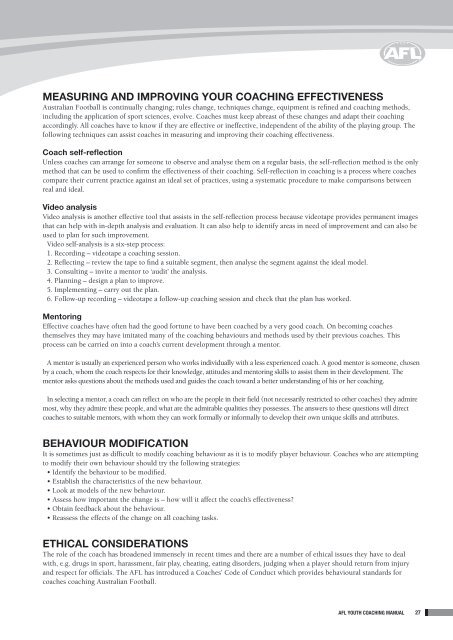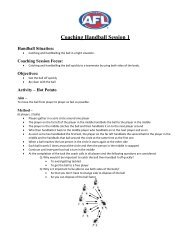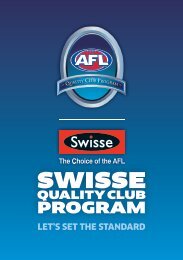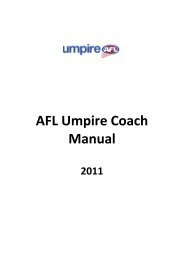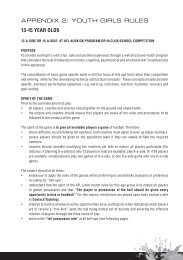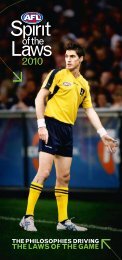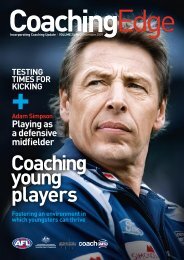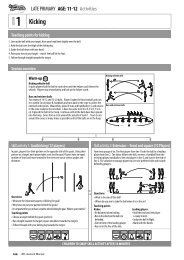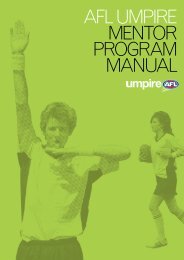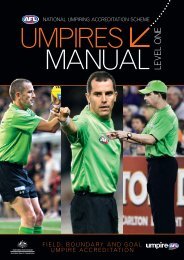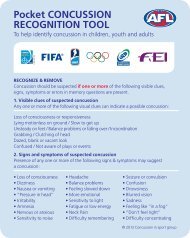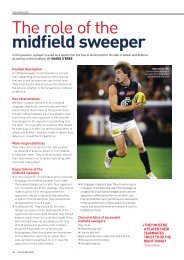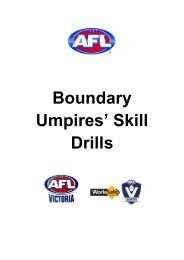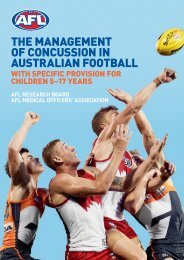2012 Youth Coaching Manual - AFL Community
2012 Youth Coaching Manual - AFL Community
2012 Youth Coaching Manual - AFL Community
Create successful ePaper yourself
Turn your PDF publications into a flip-book with our unique Google optimized e-Paper software.
Measuring and improving your coaching effectiveness<br />
Australian Football is continually changing; rules change, techniques change, equipment is refined and coaching methods,<br />
including the application of sport sciences, evolve. Coaches must keep abreast of these changes and adapt their coaching<br />
accordingly. All coaches have to know if they are effective or ineffective, independent of the ability of the playing group. The<br />
following techniques can assist coaches in measuring and improving their coaching effectiveness.<br />
Coach self-reflection<br />
Unless coaches can arrange for someone to observe and analyse them on a regular basis, the self-reflection method is the only<br />
method that can be used to confirm the effectiveness of their coaching. Self-reflection in coaching is a process where coaches<br />
compare their current practice against an ideal set of practices, using a systematic procedure to make comparisons between<br />
real and ideal.<br />
Video analysis<br />
Video analysis is another effective tool that assists in the self-reflection process because videotape provides permanent images<br />
that can help with in-depth analysis and evaluation. It can also help to identify areas in need of improvement and can also be<br />
used to plan for such improvement.<br />
Video self-analysis is a six-step process:<br />
1. Recording – videotape a coaching session.<br />
2. Reflecting – review the tape to find a suitable segment, then analyse the segment against the ideal model.<br />
3. Consulting – invite a mentor to ‘audit’ the analysis.<br />
4. Planning – design a plan to improve.<br />
5. Implementing – carry out the plan.<br />
6. Follow-up recording – videotape a follow-up coaching session and check that the plan has worked.<br />
Mentoring<br />
Effective coaches have often had the good fortune to have been coached by a very good coach. On becoming coaches<br />
themselves they may have imitated many of the coaching behaviours and methods used by their previous coaches. This<br />
process can be carried on into a coach’s current development through a mentor.<br />
A mentor is usually an experienced person who works individually with a less experienced coach. A good mentor is someone, chosen<br />
by a coach, whom the coach respects for their knowledge, attitudes and mentoring skills to assist them in their development. The<br />
mentor asks questions about the methods used and guides the coach toward a better understanding of his or her coaching.<br />
In selecting a mentor, a coach can reflect on who are the people in their field (not necessarily restricted to other coaches) they admire<br />
most, why they admire these people, and what are the admirable qualities they possesses. The answers to these questions will direct<br />
coaches to suitable mentors, with whom they can work formally or informally to develop their own unique skills and attributes.<br />
Behaviour modification<br />
It is sometimes just as difficult to modify coaching behaviour as it is to modify player behaviour. Coaches who are attempting<br />
to modify their own behaviour should try the following strategies:<br />
• Identify the behaviour to be modified.<br />
• Establish the characteristics of the new behaviour.<br />
• Look at models of the new behaviour.<br />
• Assess how important the change is – how will it affect the coach’s effectiveness?<br />
• Obtain feedback about the behaviour.<br />
• Reassess the effects of the change on all coaching tasks.<br />
Ethical Considerations<br />
The role of the coach has broadened immensely in recent times and there are a number of ethical issues they have to deal<br />
with, e.g. drugs in sport, harassment, fair play, cheating, eating disorders, judging when a player should return from injury<br />
and respect for officials. The <strong>AFL</strong> has introduced a Coaches’ Code of Conduct which provides behavioural standards for<br />
coaches coaching Australian Football.<br />
<strong>AFL</strong> <strong>Youth</strong> <strong>Coaching</strong> <strong>Manual</strong><br />
27


